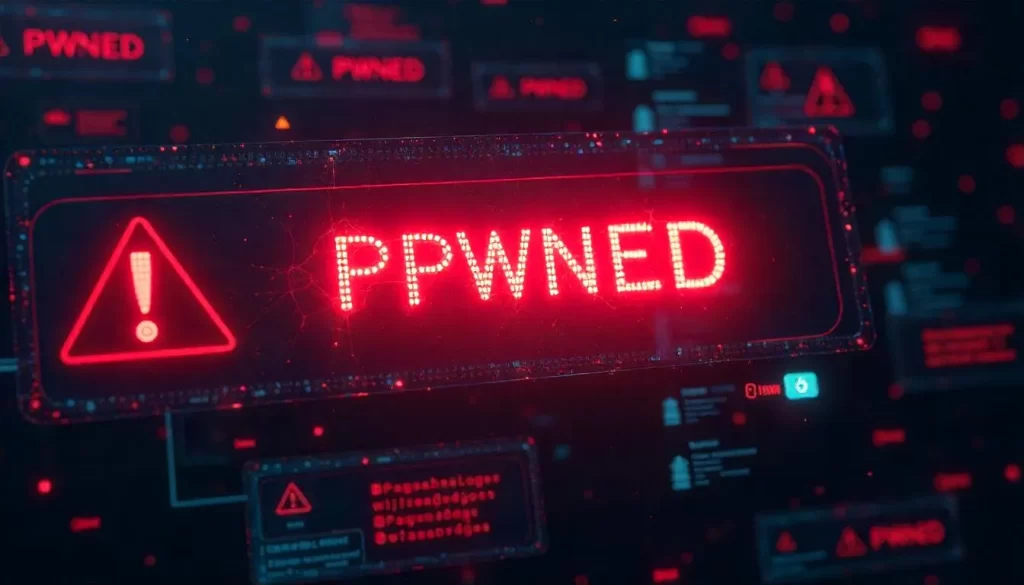In today’s interconnected world, the security of our online accounts is paramount. Pwned passwords, once exposed in cybersecurity threats or data breaches, can lead to severe vulnerabilities not just for individuals but also for businesses and entire industries. A pwned password occurs when an attacker gains access to an account using stolen login credentials, and it’s a key element in many cyber defense breaches. This article explores the broader impact of pwned passwords, how they affect cybersecurity frameworks, and what you can do to mitigate the risks.

What Are Pwned Passwords?
Defining Pwned Passwords
A pwned password refers to a password that has been compromised in a data breach. Once exposed, these passwords become the target of cybercriminals who can use them in a variety of ways ranging from identity theft to brute-force attacks that target other systems. When a password is pwned, it means that unauthorized parties have gained access to the account, potentially compromising the integrity of personal or business information.
How Do Passwords Become Pwned?
Pwned passwords usually result from cybersecurity vulnerabilities in websites or online platforms. Hackers infiltrate databases, stealing millions of user credentials, which are then often sold on the dark web or used for targeted attacks. Cybercriminals can exploit password-cracking techniques, like brute-force attacks, to break into additional accounts, further amplifying the data protection risk.
Related Posts
- Risks and Precautions for Pwned Email Addresses
- How to Check If You Have Been Pwned
- How Cybercriminals Exploit Pwned Data
The Impact of Pwned Passwords on Cybersecurity
Risks to Individual Users
For individuals, a pwned password exposes their personal data to a range of threats. These include:
- Identity theft, where a hacker assumes the user’s identity for fraudulent purposes.
- Account takeovers, where hackers gain control of email accounts, social media, or financial accounts, often making unauthorized transactions.
- Phishing attacks, where attackers send fake emails designed to trick the user into revealing further personal details.
The consequences of having a pwned password can be severe, leading to financial loss and the potential destruction of personal reputation.
Risks to Businesses
On a larger scale, businesses that suffer from pwned passwords face threats that can compromise entire company operations. These risks include:
- Data leaks, where sensitive customer or proprietary business information is exposed.
- Business disruption, where services are temporarily halted due to system access being compromised.
- Reputational damage, as customers lose trust in a business’s ability to safeguard their personal data.
- Regulatory fines, as businesses may violate data protection laws or fail to meet cyber compliance requirements.
The financial impact of a business having pwned passwords can be significant, especially if it leads to a major breach or loss of customer trust.
How Pwned Passwords Affect Cybersecurity Frameworks
The Breach Cascade Effect
A pwned password doesn’t just affect the individual or business directly impacted by the breach; it can have a cascading effect across multiple systems and networks. Once an attacker gains access to one account, they may try using the pwned password to access other linked accounts, exploiting weak security protocols across platforms. This is why ensuring password strength analysis is a key component of a robust cybersecurity framework.
Password Reuse and Cross-Site Attacks
Many individuals and employees reuse passwords across different websites and platforms. This practice exacerbates the cybersecurity risks associated with pwned passwords. If a password is pwned in one system, attackers may use it to gain access to other systems, including corporate networks, email accounts, and even financial institutions. This increases the potential attack surface for any organization and undermines the cyber defense efforts put in place.

Mitigating the Risks of Pwned Passwords
Strengthening Password Policies
One of the most effective ways to prevent pwned passwords is to enforce strong password policies across organizations. Passwords should:
- Be long (ideally 12+ characters).
- Include a mix of uppercase and lowercase letters, numbers, and symbols.
- Be unique for each account to avoid the risks associated with password reuse.
Enabling Two-Factor Authentication (2FA)
To protect against pwned passwords, two-factor authentication (2FA) should be enabled wherever possible. 2FA adds an additional layer of security, requiring the user to provide a second form of verification, such as a code sent to their phone. This significantly reduces the likelihood of an attacker gaining unauthorized access to the account, even if the password is compromised.
Using Password Managers
To maintain password strength and reduce the temptation to reuse passwords, individuals and businesses can use password managers. These tools store and encrypt passwords securely, ensuring that users can easily access their accounts without compromising on security. Password managers can also generate strong, random passwords for each login, minimizing the risk of pwned passwords.
The Role of Encryption in Protecting Against Pwned Passwords
Password Encryption Methods
One of the best ways to prevent pwned passwords from being exploited is by using encryption. Password encryption converts a password into a format that is unreadable unless you have the decryption key. Even if a password database is breached, encrypted passwords remain protected, as the attackers cannot easily decipher them without the proper key.
Encryption in Data Protection
Besides passwords, data stored within systems and transmitted over networks should also be encrypted. This ensures that even if cybercriminals manage to infiltrate the system, the data remains unreadable and unusable, thus mitigating the impact of pwned passwords.
Related Posts
- Impact of Pwned Passwords and Accounts
- What Does “Pwned” Mean?
- Behind “Have I Been Pwned”: Database and Functionality
Compliance with Data Protection Laws
The Importance of Cyber Compliance
Organizations must also comply with data protection laws such as the General Data Protection Regulation (GDPR) in the EU or the California Consumer Privacy Act (CCPA). These laws require businesses to take adequate measures to protect their customers’ personal data, including enforcing strong password protection practices and notifying customers when their data has been compromised.
Failure to comply with these regulations can lead to hefty fines and further reputational damage, especially when pwned passwords lead to massive data breaches.
Protecting Your Digital Life from Pwned Passwords
The risk of pwned passwords in cybersecurity is real, and its impact extends beyond individual users to businesses and entire industries. By implementing robust security protocols, enforcing password strength, using two-factor authentication, and adhering to cyber compliance, you can greatly reduce the likelihood of becoming a victim of pwned passwords. Regularly monitoring for data breaches and password breaches is also key to staying ahead of potential attacks.
Key Takeaways
- Pwned passwords expose users to significant risks, including identity theft, account takeovers, and cybersecurity threats.
- Businesses and individuals should enforce strong password policies, enable two-factor authentication (2FA), and use password managers to mitigate the risks.
- Encryption and adherence to cybersecurity compliance regulations are crucial in protecting against pwned passwords and data breaches.
Frequently Asked Questions (FAQs)
What is a “pwned password”?
A pwned password is a password that has been exposed in a data breach or cyberattack, leaving it vulnerable to exploitation.
How can I protect myself from pwned passwords?
To protect against pwned passwords, use strong passwords, enable two-factor authentication (2FA), and regularly monitor your accounts for signs of unauthorized access.
How does encryption help protect against pwned passwords?
Encryption ensures that even if passwords are compromised in a data breach, they are unreadable and cannot be easily exploited by cybercriminals.
What should businesses do to prevent pwned passwords?
Businesses should implement strong password policies, require two-factor authentication, and ensure cyber compliance to protect against pwned passwords.
